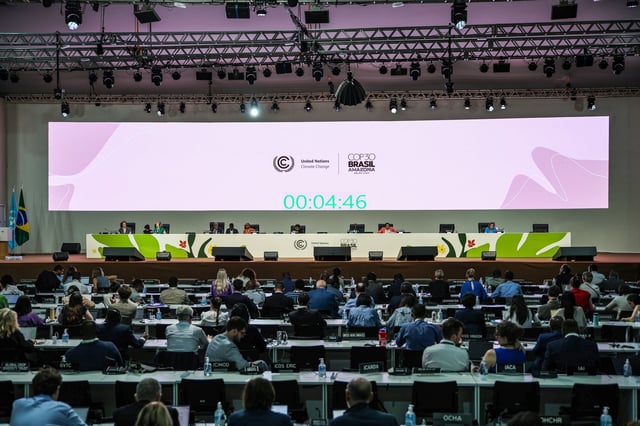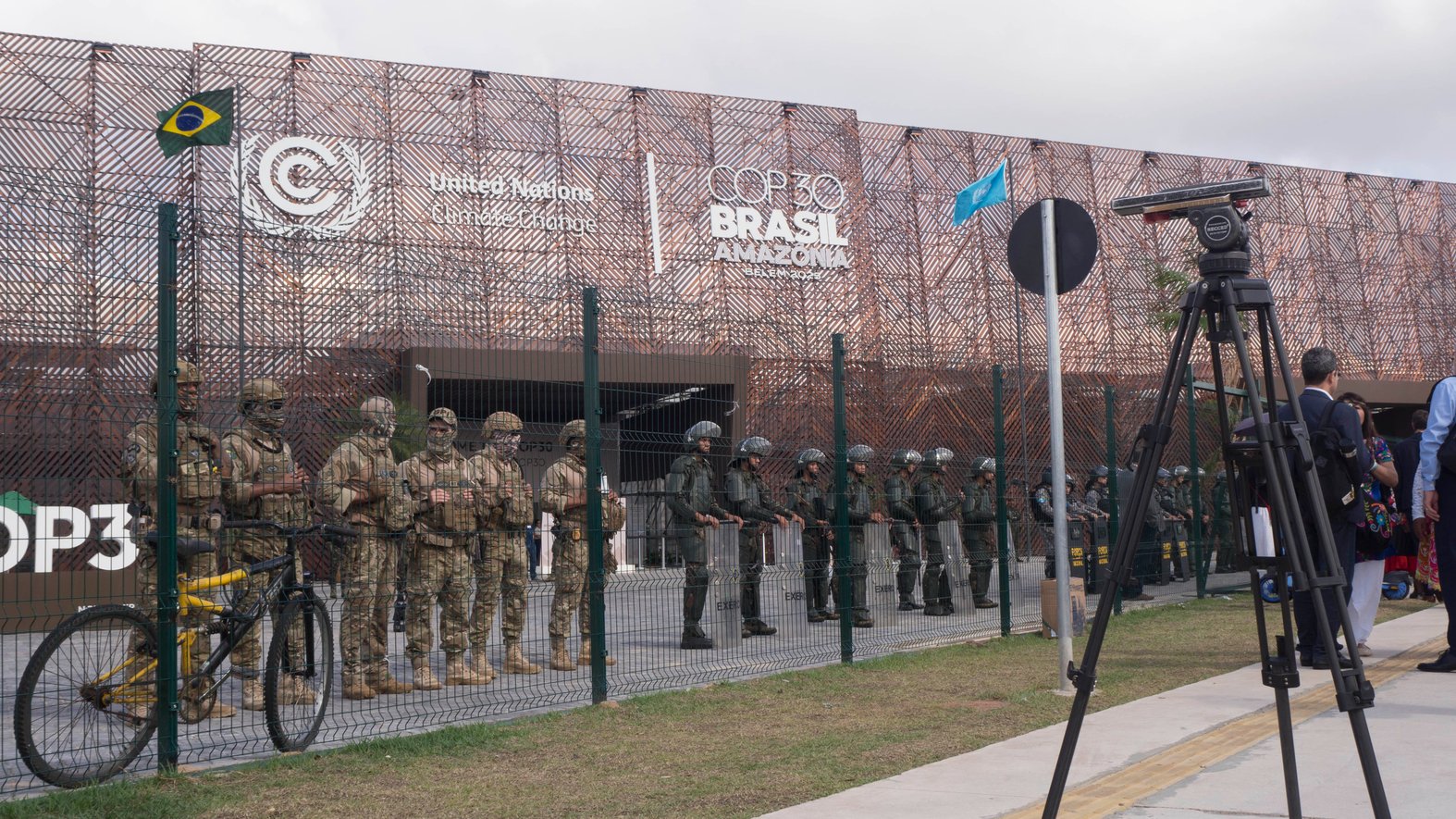
Photo: Military police line the perimeter of the Blue Zone at COP30 in Belém. Photo by Royce Kurmelovs.
The sun beat down on an unusually hot, humid morning in Belém, Brazil and thousands of delegates had arrived outside the Blue Zone at COP30 to be greeted by men armed with bows and arrows. They had set up an impromptu road block outside the pavilion where negotiations were taking place as part of the international climate change conference. As the crowd swelled—among them the CEO of Total, the only head of a fossil fuel company to attend this year’s negotiations in an official capacity, by invitation of the French government—the purpose of these men became clear. A group from the Munduruku, an Indigenous community protected by a ring of non-Indigenous supporters, whose land stretches across the Brazilian states of Pará and Mato Grosso, had blocked the official entrance to stage a protest. It sent a powerful message: lock us out, we lock you out.
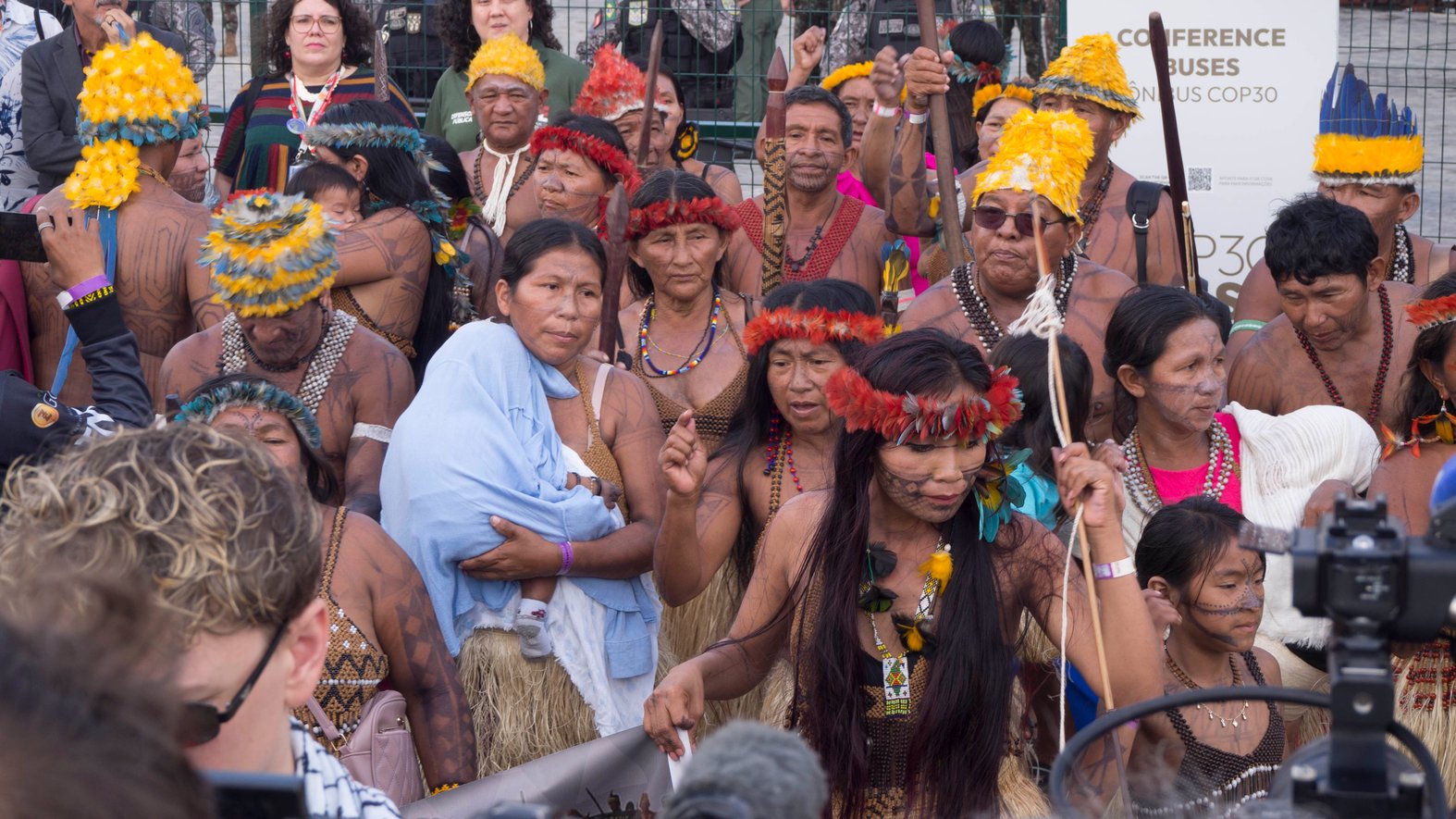
A group from the Munduruku blocked the official entrance to the COP30 pavilion in a non-violent protest on 14 November 2025 (Credit: Royce Kurmelovs)
The group’s demands were simple. An urgent meeting with Brazilian president Luiz Inacio Lula de Silva and the revocation of a decree that would target rivers on their traditional territory for cargo shipping, a decision that would “open the gate” to more logging and mining activities on their land. In a statement released to coincide with the protest, the Munduruku Ipereg Ayu Movement said the decision threatened to end their way of life.
“There is no reduction in global warming without the presence of indigenous peoples,” it said. The peaceful protest, endorsed by COP30 Executive Director Ana Ton as “legitimate”, was not the only one. After two consecutive COPs in authoritative countries with no tolerance for dissent, Brazil’s colorful democracy has brought activism back at this year’s climate summit. In the opening days of the conference, another Indigenous group broke through security at the front gate, some carrying banners that read “Our forests are not for sale”, a reference to carbon credit projects that Indigenous communities say commodify the forest. On Saturday, tens of thousands of people joined a colorful and vibrant protest march through Belém to demand “real solutions” to the existential threat posed by climate change.
Inside the Blue Zone, the dedicated area where negotiations are taking place, the atmosphere is officious. Throughout the week, the air conditioning system has struggled to beat back the heat radiating from tens of thousands of bodies packed into the exhibition hall, and an unusually hot and humid summer, even for the Amazon. In the mornings the Australian coffee queue duels with the Turkish tea line, a symbolic spectacle given their competition to host the next COP; in the evenings the Portuguese open 40 bottles of wine for the public to drink until they run out. A vast, temporary structure has been erected in the middle of Belém’s Parque da Cidade to house the delegates, negotiating teams and international media, supported by a massive logistical operation whose inner workings are kept largely out of view.

General map of the Blue Zone at COP30 in Belém, Brazil (Credit: Royce Kurmelovs)
Ten years on, COP30 represents a stress-test of The Paris Agreement. Despite all the promises and pledges over the years, and the commitment at Dubai in COP28 to phase out oil, gas and coal “in line with the science”, oil and gas production have only increased since Paris, and emissions along with them. The world has breached the 1.5C target. Efforts to reduce emissions to date have prevented the worst case scenarios but under current trajectories, the world is still on track for 2.6C of warming. More has to be done—a reality that President Lula appeared to acknowledge in his opening speech when he said “COP30 must be the COP of truth”.
“It is time to take the scientific warnings seriously,” he said. “It is time to face reality and decide whether we will have the courage and determination necessary to change.”
As part of making this the “COP of truth,” Lula’s government has backed a UN Global Initiative on Climate Information Integrity and in the first week of COP spearheaded a new Declaration on Information Integrity on Climate, which has been endorsed by ten countries so far: Brazil, Canada, Chile, Denmark, Finland, France, Germany, Spain, Sweden and Uruguay. Nonetheless, the first week of the event was full of contradictions. COP30 was supposed to be an Indigenous COP, but the Indigenous pavilion is somewhere else. Despite this, the presence and visibility of Indigenous people at COP30 has been greater than ever before – but so too has been representation from the fossil fuel industry. A count by Kick Polluters Out coalition found 1600 lobbyists had obtained access to COP30, amounting to one in 25 participants.

Poster board in the Blue Zone that reads “COP30 is for everyone” (Credit: Royce Kurmelovs)
Belém was supposed to be a global meeting to discuss implementation. By the end of the first week, chatter among NGOs and diplomats, particularly those involved in pushing for a fossil fuel phaseout, expressed skepticism that any “roadmap” for dealing with climate change would include timelines, binding commitments and processes to determine these things. An attempt by Colombia to secure support for a recent International Court of Justice advisory opinion was scuttled when European countries and Australia balked. So far, “implementation” has largely meant discussions around technological fixes and carbon markets opposed to transitioning off of fossil fuels. Still, at a time when multilateralism is under attack, where the space for people of different cultures, nations and ideologies can meet to talk about problems is diminished, the throng of people from across the world in one place to talk about climate change resembles something hopeful. Multilateral diplomacy, however, is famously a place where hope goes to die.
If COP were a pointless exercise, it wouldn’t be targeted so heavily by the fossil fuel industry. To date, the process has been the primary vehicle through which governments have sought to address climate change in some form. Since the United Nations Framework Convention on Climate Change was signed three decades ago, delegations have ostensibly meant to be meeting to work through the science, establish the economics and ultimately plan for the phaseout of oil, gas and coal, although explicitly talking about the phaseout of fossil fuels is a relatively new thing for COP. Even as Global South countries, particularly those in climate-exposed regions where shrinking glaciers, rising oceans and more frequent disasters have pushed for real, material action to end the production and consumption of fossil fuels – and COP watchers agree they’ve never seen so much discussion of fossil fuel phaseout at the climate summit – this language has made delegations from richer countries nervous.
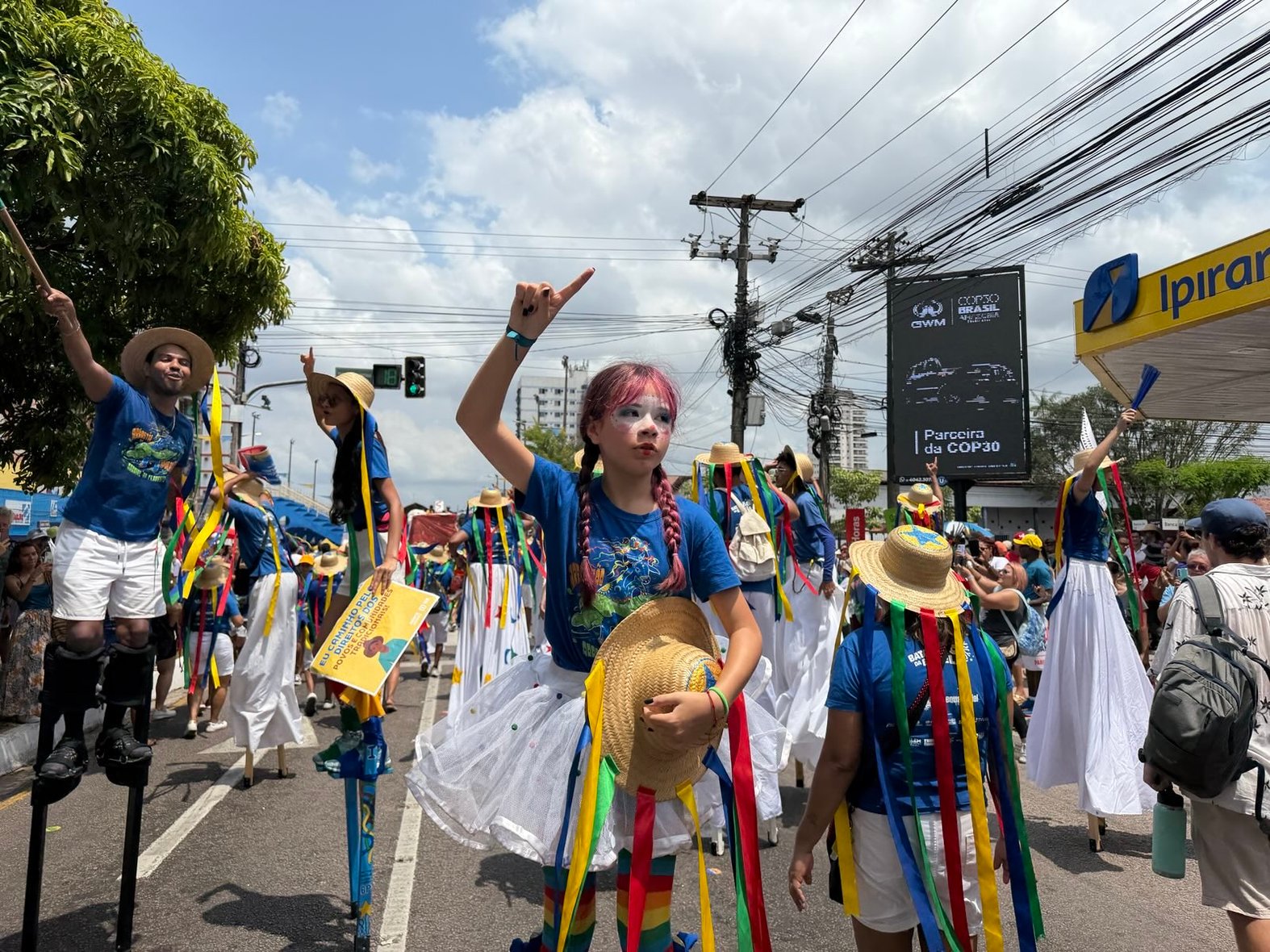
Young girl among thousands participating in the Great People's March in Belém, Brazil during COP30 on 15 November 2025 (Credit: Lindsay Crowder).
Sometimes these objections are framed as tactical – language too strong or forceful would face obstruction from Saudi Arabia and other OPEC countries, whose delegations would object, saying they are being ambushed with new material. Saudi Arabia, however, has long provided a convenient villain for wealthier countries whose economies rely heavily on the production and export of fossil fuels. According to one analysis by Oil Change International, just four countries—the United States, Canada, Norway and Australia – will be responsible for 70% of all new oil and gas expansion planned over the next decade. Those same countries have been responsible for the bulk of new production in the last decade as well, while Saudi’s production has declined in the same decade. U.S. President Donald Trump, whose campaign received USD $75m from the oil and gas industry, may have pulled out of The Paris Agreement on his first day of his second term in office, but any embrace of language that explicitly outlines a fossil fuel phaseout would invariably create political problems at home.
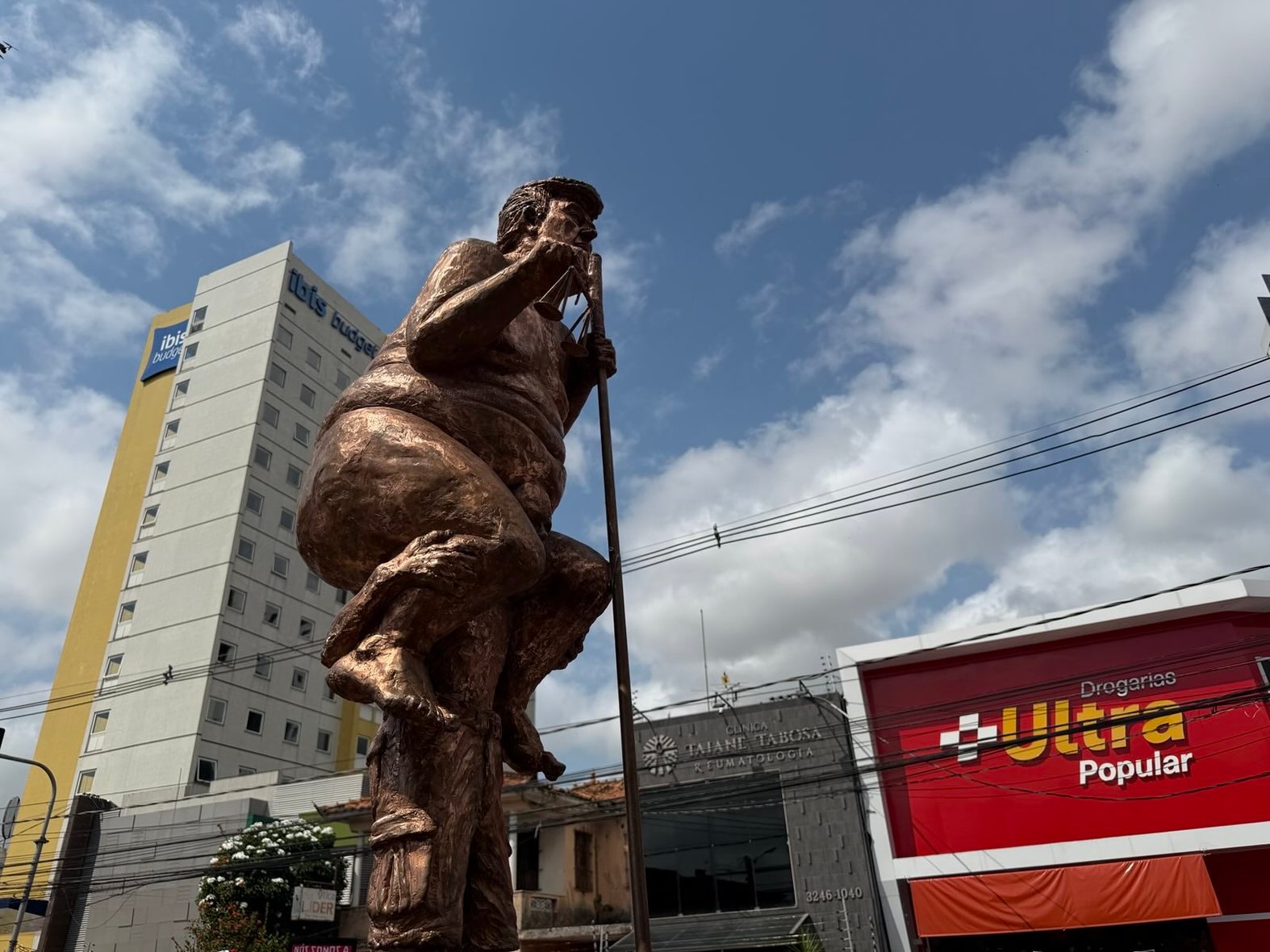
Statue of Donald Trump riding atop another human seen during the Great People's March in Belém, Brazil during COP30 on 15 November 2025 (Credit: Lindsay Crowder).
An immediate logistical problem looms in the question of who will host the next COP. The two candidates, Turkey and Australia represent two fundamentally different propositions, but have remained deadlocked by the end of the first week. Australia was widely considered the favorite. A major fossil fuel producer, the country has taken significant steps toward transitioning its electricity grid, with some jurisdictions running on 100% renewables for weeks at a time. The COP, which would be held in collaboration with the Pacific, would mark the first ever held in Oceania, and the first in the broader regions since the 2007 COP in Bali. To date, however, Turkey has engaged in an act of brinkmanship, refusing to negotiate or budge on the understanding that any failure to decide would force the conference to be held in Bonn, Germany, the home of the UNFCCC. Germany, however, has said it does not want to host the conference, which would need to be organized in six months, but would do so reluctantly if forced. Should the situation fail to resolve, and the location default to Germany, it is possible COP31 would be significantly diminished – right at a moment when climate science says the world must go further, faster.
As we head into week two, the big debates for negotiators look to be shaping up around three key areas of implementation: finance—the age-old question of who will pay for the energy transition; logistics—how exactly a transition will work, via the Just Transition Mechanism (alternately referred to as the Belém Action Mechanism), backed by the G77 countries and China, which is taking a bolder position at this year’s COP than it has in years past; and technology—just how much the world will pin all of its hopes for reducing emissions on tech solutions versus reducing fossil fuel demand and production.
Whatever fate world leaders choose here in Belém, its people have welcomed the world to their home, the gateway to the Amazon, and have taken their obligations as hosts seriously. They have tolerated the streets clogged with traffic and the lack of fluency in Portuguese with kindness and grace. This is their moment to show how they live and they are taking it, as they—and the rest of us—wait to learn whether world leaders will move to protect life on Earth or profits for industry.


